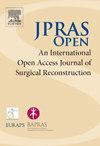One-Year Quality of Life Outcomes of Delayed Unilateral Autologous Breast Reconstruction and Associated Patient Factors
IF 1.5
Q3 SURGERY
引用次数: 0
Abstract
Introduction
As breast cancer survival rates improve, the long-term quality of life (QoL) has become increasingly important. With a significant number of patients still undergoing mastectomy and experiencing its well-known negative impacts on QoL, breast reconstruction aims to mitigate this by restoring body integrity. This study aimed to evaluate the changes in QoL and satisfaction in patients after breast reconstruction and influence of various patient-related factors.
Methods
Patients who underwent delayed unilateral deep inferior epigastric perforator (DIEP) breast reconstruction at a single institution between January 2016 and April 2019 were surveyed. QoL was assessed using the BREAST-Q questionnaire preoperatively and one year postoperatively. Scores were compared between the time points, and regression analysis was conducted to identify the influence of age, body mass index, economic status, education level, and relationship status on QoL.
Results
Among the 93 patients, 55 completed the preoperative and one-year postoperative BREAST-Q questionnaires (response rate: 59%). Postoperative QoL scores significantly increased for the domains “satisfaction with breasts,” physical well-being chest,” “sexual well-being,” and “psychosocial well-being” (p<0.001). The scores for the domain “physical well-being abdomen” remained unchanged one year postoperatively. Higher education correlated with greater satisfaction with the breasts. Lack of an intimate partnership was identified as a significant negative factor for poorer psychosocial well-being.
Conclusions
Delayed unilateral DIEP breast reconstruction significantly enhances QoL and breast satisfaction one year postoperatively without causing long-term physical discomfort at the donor site. Education level and relationship status significantly affect the postoperative outcomes. Tailored preoperative counseling and psychosocial support are essential to maximize patient satisfaction and well-being following reconstruction.
延迟单侧自体乳房再造术一年后的生活质量结果及相关患者因素
导言:随着乳腺癌存活率的提高,长期生活质量(QoL)变得越来越重要。许多患者仍在接受乳房切除术,其对 QoL 的负面影响众所周知,乳房重建旨在通过恢复身体的完整性来缓解这一问题。本研究旨在评估乳房重建后患者QoL和满意度的变化以及各种患者相关因素的影响。方法调查了2016年1月至2019年4月期间在一家机构接受延迟单侧下腹深穿孔器(DIEP)乳房重建的患者。使用 BREAST-Q 问卷对术前和术后一年的 QoL 进行评估。结果93名患者中有55人完成了术前和术后一年的BREAST-Q问卷调查(回复率:59%)。术后 QoL 在 "对乳房的满意度"、"胸部的身体健康"、"性健康 "和 "社会心理健康 "方面的得分均有显著提高(p<0.001)。而 "腹部身体健康 "领域的得分在术后一年保持不变。教育程度越高,对乳房的满意度越高。结论延迟单侧 DIEP 乳房重建可显著提高术后一年的生活质量和乳房满意度,且不会造成供体部位的长期身体不适。教育水平和关系状况对术后效果有很大影响。有针对性的术前咨询和社会心理支持对最大限度地提高患者的满意度和重建后的幸福感至关重要。
本文章由计算机程序翻译,如有差异,请以英文原文为准。
求助全文
约1分钟内获得全文
求助全文
来源期刊

JPRAS Open
Medicine-Surgery
CiteScore
1.60
自引率
0.00%
发文量
89
审稿时长
22 weeks
期刊介绍:
JPRAS Open is an international, open access journal dedicated to publishing case reports, short communications, and full-length articles. JPRAS Open will provide the most current source of information and references in plastic, reconstructive & aesthetic surgery. The Journal is based on the continued need to improve surgical care by providing highlights in general reconstructive surgery; cleft lip, palate and craniofacial surgery; head and neck surgery; skin cancer; breast surgery; hand surgery; lower limb trauma; burns; and aesthetic surgery. The Journal will provide authors with fast publication times.
 求助内容:
求助内容: 应助结果提醒方式:
应助结果提醒方式:


